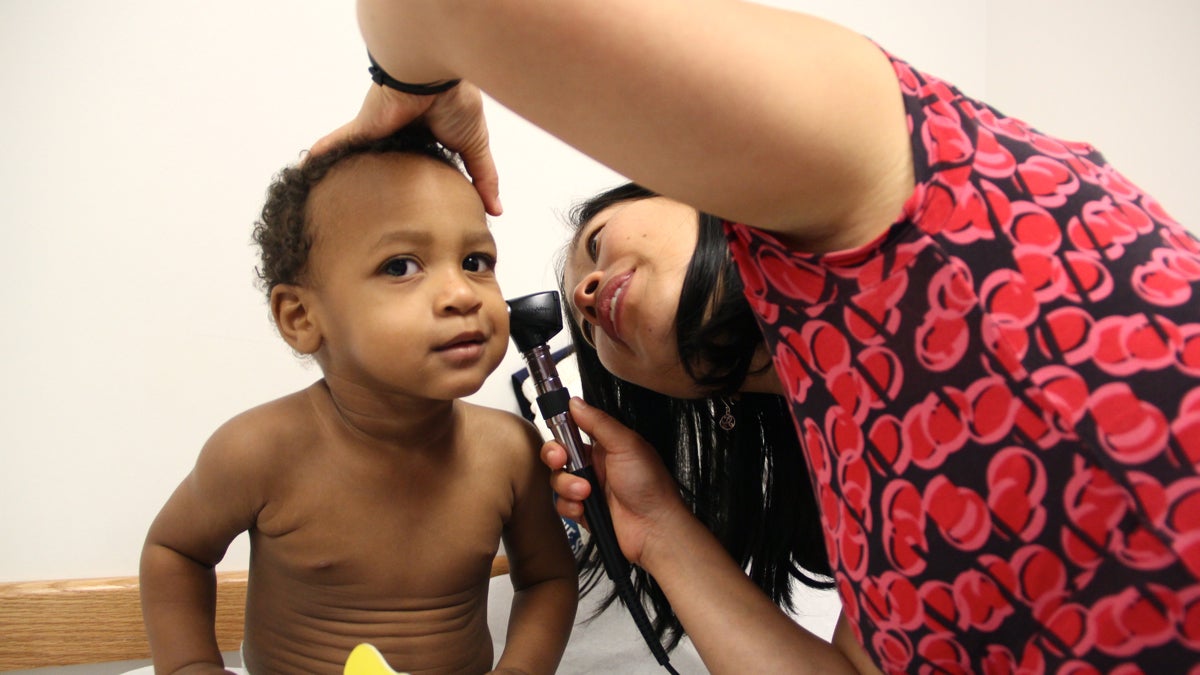Pediatricians urged to screen all children for hunger

Keith Patrick, 17 months, gets a checkup from Dr. Elena Huang at Karabots Pediatric Care Center. The American Academy of Pediatrics now recommends that physicians screen all children for food insecurity. (Emma Lee/WHYY)
At your kid’s next doctor’s visit, you might be asked a new question: Are you having trouble putting food on the table?
The American Academy of Pediatrics is recommending that physicians screen all children for hunger during office visits.
Mariana Chilton of Drexel’s Dornsife School of Public Health, who has researched food insecurity for 15 years, said she welcomed the policy change.
“If we can prevent food insecurity in the future for kids, then that’s going to prevent hospitalizations and it’s going to promote the child’s health,” she said. “The child will not only be healthier but will do better in school.”
Pediatricians might not realize it, Chilton said, but they can play an important role in connecting caregivers to resources, including food banks, local nonprofits and community partners, as well as governmental programs such as SNAP (formerly called food stamps) and WIC (a supplemental nutrition program for women, infants and children).
Saba Khan, a pediatrician and the medical director for the Children’s Hospital of Philadelphia’s healthy weight program, acknowledged that asking about hunger can be hard.
“It is one of the most difficult conversations I’ve had in my practice,” she said, “to make them still feel that they haven’t done anything wrong.”
She recalled one instance five years ago when during an 11-year-old’s check-up she slowly came to realize the boy was complaining of belly pain due to hunger. He told her she wouldn’t be able to fix it.
At the time, he was right. Khan wasn’t yet aware of the local food pantries or how to direct his grandmother to get help. But that humbling moment launched her interest in food insecurity, and for three years, CHOP has been screening kids at certain offices.
“We are the new church, the new mosque, the new synagogue,” said Khan. “And so we need to have resources there for the families that we serve.”
Hans Kersten, a pediatrician at St. Christopher’s Hospital for Children, said time constraints also pose a problem.
“Pediatricians have about eight minutes to see a patient, and to think that we’re going to address a lot of other issues is a tough challenge,” he said. But, he added, “children’s health is tied to a lot of other things besides what we’ve traditionally done, and it’s imperative that we do it.”
Kersten’s clinic has been screening kids for about four years. He has caregivers fill out a standard questionnaire, which includes two questions designed to test for food insecurity. All patients are asked to fill it out, so no one feels singled out. If there are concerns, his office has social workers and even a medical legal team to help patients sign up for assistance.
City-wide, about one in four young children in Philadelphia may go hungry on any given day. Nationally, the number is about one in five.
WHYY is your source for fact-based, in-depth journalism and information. As a nonprofit organization, we rely on financial support from readers like you. Please give today.

